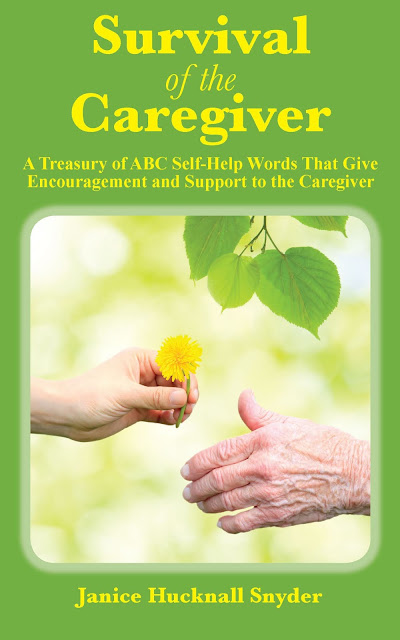Excerpt from Survival of the Caregiver (Snyder): Abilities, Acceptance, Accommodating, and Achilles Heel
Excerpt from Survival of the Caregiver A Treasury of ABC Self-Help Words that Give Encouragement and Support to the Caregiver by Janice Hucknall Snyder:
ABILITIES are unique and varied in each individual. I hope your parents let you become the person you were meant to be. Did they? If so, then you have developed your own interests. You have been given the opportunity of becoming a happy and well-adjusted person. In which case, you are now better prepared mentally to deal with your current role as caregiver. In fact, all the problems that face you during your lifetime will be more manageable. It is a tragedy when a child is expected to follow in his/her parent’s footsteps. Many times, it leads to failure, depression and even self-destruction. Ultimately, some of these people end up requiring a caregiver—sad but true. When you are comfortable with who you are, you are better able to respond in affirmative ways to all others. When your life is smothered in negative thoughts and feelings, you are trapped within yourself. That makes it very difficult to be giving and cheerful when caring for someone who is confined. As a caregiver, it is important to keep your mind open to receiving and accepting happiness, no matter what the circumstances. You need to continue to use your God-given abilities to grow and enjoy who you are.
ACCEPTANCE of what is unalterable is half the battle. When my husband became disabled with Parkinson’s disease and then developed the complications of Dementia, it was truly difficult to accept the circumstances in which I found myself. I finally came to realize that constantly fretting about what had happened to our lives wouldn’t change one thing. What you can’t change from without, you have to change from within. I could not change what had happened to my husband, but I could change how I perceived it. Acceptance helped me deal with the circumstances in a positive way. Positive thinking is very important when giving hope and encouragement to the disabled and to yourself.
ACCOMMODATING means adapting. This is something caregivers need to keep in mind. The more you simplify daily procedures, the more time is left over for personal activities. If there are time-consuming problems within your daily routine, stop and think about how they could be done with less difficulty. Often, the solution is so simple that it is overlooked. Ask other people how they would handle the problem. Someone who is less involved, day in and day out, may see the answer immediately. I had a big problem keeping the fitted sheet on my husband’s bed from pulling loose every night. The sheet and the plastic protective cover underneath the sheet would slip off easily because of my husband’s tossing and turning. One day, a mail-order catalog arrived at the house (order one item and you are on everyone’s list forever). Catalogs are fun to look through and can give you good ideas. This particular magazine pictured elastic garters to put on the corners of the sheets to keep them in place. I ordered some, thinking my problem was solved. Wrong. They worked fine, but since I had to change the sheets frequently, I found putting the garters on and off laborious. Another catalog arrived later. Another possibility. This time I ordered Styrofoam fitted corners. I put the garters on the plastic mattress cover to hold it firmly. Then, the Styrofoam corners went on each corner of the fitted bottom sheet. The Styrofoam corners took a second to put on and take off, but they worked great. Problem solved? Well, yes, but sometime later I realized I could just sew bands of elastic to the corners of the sheets permanently. That was better yet. Still later, someone told me if I just added an extra pad to the protective covering at nighttime, it would keep the sheet from even getting wet and needing to be changed at all. So, through trial, error, and adaptation, solutions were found. The solutions saved me time, energy, and loads of frustration. Be accommodating to yourself. Think about the daily chores that are the biggest hassles. Try a different way— adapt.
ACHILLES’ HEEL Do you have one? Most of us do. However, we don’t always want to recognize our own vulnerability. Are you too quick to anger, do you become overemotional, are you easily offended, are you a procrastinator, or perhaps, are you all of these? If you weren’t before you were a caregiver, you probably are now. Maybe your “weak spot” is not being able to say “no” to anyone. If so, you are in big trouble. With your hectic schedule, there should be no qualms about saying, “Sorry, no can do,” to family and friends. People who love and care about you will not have their feelings hurt. The rest don’t count. If you don’t learn to say “no,” you will probably wear out long before the person you are caring for does.
For more posts about Janice Snyder and her book, click HERE.




Comments
Post a Comment